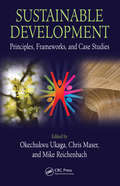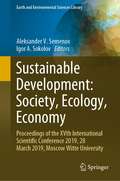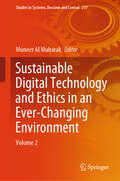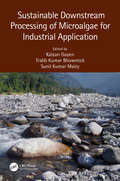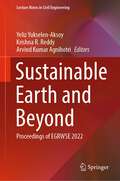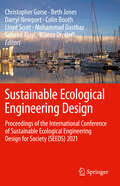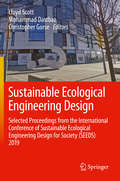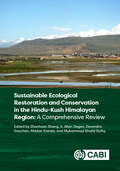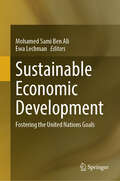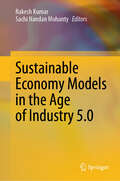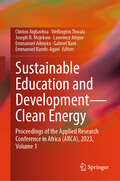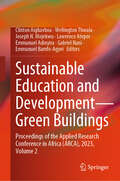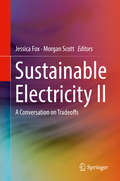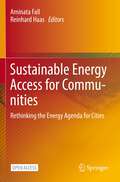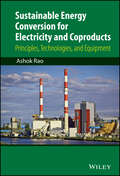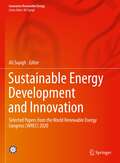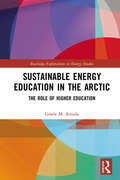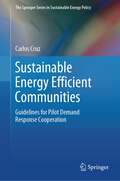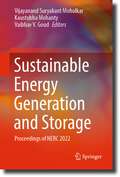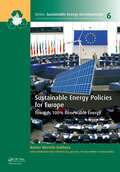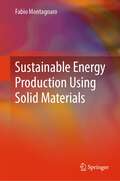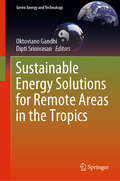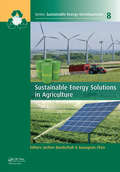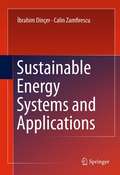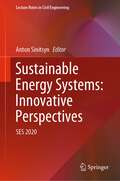- Table View
- List View
Sustainable Development: Principles, Frameworks, and Case Studies
by Chris Maser Okechukwu Ukaga Mike ReichenbachCoined in the 1970s, the term sustainable development and the ideas behind it have enjoyed varying amounts of popularity over the years. And while dire predictions abound, the full impacts of global warming are not known, nor can they be known. What we do know is that to be sustainable, all societies must adjust to new realities, which include chan
Sustainable Development: Proceedings of the XVth International Scientific Conference 2019, 28 March 2019, Moscow Witte University (Earth and Environmental Sciences Library)
by Aleksander V. Semenov Igor A. SokolovThis book presents the results of studies that determine the most effective ways for human development, ensuring a decent life, and preserving natural resources within the framework of the defined issues. Russia is a participant of the United Nations Global Agreement on implementing sustainable development, adopted in 2015. Russia is a large country, both in terms of population and territory, that can significantly influence the achievement of sustainable development goals. Russia is actively promoting social responsibility practices and sustainable development among scientists, specialists, and students. The presented articles highlight the main problems in ecology, economy, education, and law; and analyses the opportunities and prospects in achieving sustainable development goals in the context of modern conditions.
Sustainable Digital Technology and Ethics in an Ever-Changing Environment: Volume 2 (Studies in Systems, Decision and Control #237)
by Muneer Al MubarakDigital technology contributes to sustainability as it positively impacts society and environment, improves efficiency, and minimizes waste. It is best functioned when ethics in technology and privacy are fully considered. Digital ethics deals with the impact of digital information on societies and the environment. Issues that are of concern include privacy, information overload, Internet addiction, and robotics. Digital ethics pays special attention to developing rules and moral guidelines that individuals and companies should follow when interacting with technology. Digital ethics gives guidelines on what is the right thing to do and wrong thing to avoid. No doubt that the emergence of digital technologies such as IoT and AI can improve people's life and organizations' efficiency but should be appropriately governed. Today's society places a growing emphasis on sustainability, and digital technologies as they are essential to attaining sustainable development. Digital technologies can be used to lessen negative environmental impact, conserve resources, and create communities that are more resilient. Digital technologies can help to promote sustainability through the utilization of renewable energy sources. Sustainable environmental practices can benefit from the transition to digital technology revolution. Sustainability solutions are developed and put into practice using a variety of technologies, including AI, big data analytics, IoT, social media, as well as mobile technology. To discover infections that occur in the river systems, for instance, smart water management systems, an AI-based technology, is being utilized. Data obtained from such technologies may be used to analyze the problem of water contamination and create and execute remedies. Additionally, through lowering waste and carbon emissions, AI, IoT, and Big Data analytics technologies improve the sustainability of corporate activities. Technology is an essential aspect of modern life, and it has transformed the way people communicate, work, and interact with each other drastically over the last few decades. While technology has brought many benefits, it has also created ethical challenges. Technology ethics is a field of study that seeks to understand and address the ethical challenges posed by the advancement and development of technology.
Sustainable Downstream Processing of Microalgae for Industrial Application
by Kalyan Gayen Tridib Kumar Bhowmick Sunil Kumar MaityMicroalgae can be future resource for industrial biotechnology In current energy crisis era, microalgae are under tremendous research focus for the production of biodiesel due to their high photosynthetic efficiency, growth rate and high lipid content compared to territorial plants. However, the large-scale production of algal biomass and downstream processing of harvested algae towards bio-fuels are facing several challenges from economic viability perspective. Apart from bio-fuels, the microalgae synthesize number of bio-molecules such as pigments (e.g., chlorophyll, carotenoid), protein (e.g., lectin, phycobiliprotein), and carbohydrates (e.g., agar, carrageenan, alginate, fucodian) which are available in the various forms of microalgal products. Therefore, developing a strategy for large-scale production and use of algal biomass for the co-production of these value-added macromolecules is thus imperative for the improvement of the economics of algal biorefinery. In the above context, this book covers three major areas (i) commercial-scale production of bio-molecules from microalgae, (ii) sustainable approach for industrial-scale operation, and (iii) optimization of downstream processes. Each of these sections is composed of several chapters written by the renowned academicians/industry experts. Furthermore, in this book, a significant weightage is given to the industry experts (around 50%) to enrich the industrial perspectives. We hope that amalgamate of fundamental knowledge from academicians and applied research information from industry experts will be useful for forthcoming implementation of a sustainable integrated microalgal biorefinery. This book highlights following. Explores biomolecules from microalgae and their applications Discusses microalgae cultivations and harvesting Examines downstream processing of biomolecules Explores sustainable integrated approaches for industrial scale operations Examines purification techniques specific for microalgal proteins, Omega 3 fatty Acids, carbohydrates, and pigments
Sustainable Earth and Beyond: Proceedings of EGRWSE 2022 (Lecture Notes in Civil Engineering #370)
by Krishna R. Reddy Arvind Kumar Agnihotri Yeliz Yukselen-AksoyThis book presents select proceedings of the Third International Conference on Environmental Geotechnology, Recycled Waste Materials and Sustainable Engineering (EGRWSE-2022). It covers state-of-the-art research on environmental geotechnology, sustainability, and use of recycled waste materials for civil infrastructure along with latest accomplishments, trends, concerns, innovations, practical challenges encountered, and the solutions adopted in this field. Given the contents, this book is useful for researchers, engineers, and professionals working in the areas of geoenvironmental engineering, waste management, and sustainable engineering and associated fields.
Sustainable Ecological Engineering Design: Proceedings of the International Conference of Sustainable Ecological Engineering Design for Society (SEEDS) 2021
by Beth Jones Mohammad Dastbaz Christopher Gorse Colin Booth Lloyd Scott Darryl Newport Saheed Ajayi Bianca DrotleffThe International Conference of Sustainable Ecological Engineering Design for Society (SEEDS) brings together global experts to focus on a sustainability agenda and the positive and detrimental changes that are taking place. Papers presented at the conference come from across a broad spectrum of the Sustainable Development Goals (SDGs) and bring forward practices to tackle the climate emergency and evaluate their impact. It addresses technical issues, measuring, monitoring, and assessing change, emphasizing the environment, infrastructure, and buildings, how they exist in relative isolation, and the possibilities for sustainable integration. The SEEDS Conference addresses the interdependence of people and the built and natural environments and recognizes the interdisciplinary and international themes necessary to assemble the knowledge required for positive change.
Sustainable Ecological Engineering Design: Selected Proceedings from the International Conference of Sustainable Ecological Engineering Design for Society (SEEDS) 2019
by Mohammad Dastbaz Christopher Gorse Lloyd ScottThrough research and proven practice, the aim of the International Conference of Sustainable Ecological Engineering Design for Society (SEEDS) is to foster ideas on how to reduce negative impacts on the environment while providing for the health and well-being of society. The professions and fields of research required to ensure buildings meet user demands and provide healthy enclosures are many and diverse. The SEEDS conference addresses the interdependence of people, the built and natural environments, and recognizes the interdisciplinary and international themes necessary to assemble the knowledge required for positive change.
Sustainable Ecological Restoration and Conservation in the Hindu Kush Himalayan Region: A Comprehensive Review
by Professor Zhanhuan Shang Professor Allan Degen Dr Devendra Gauchan Professor Madan Koirala Dr Muhammad Khalid RafiqThe years 2021 to 2030 have been designated as "The United Nations Decade on Ecosystem Restoration". Ecological restoration and biodiversity conservation efforts face unprecedented challenges, especially in developing countries and areas, such as the Hindu Kush-Himalayan (HKH) region. This huge HKH region, which includes areas in eight separate countries (Afghanistan, Pakistan, Nepal, India, China, Bangladesh, Myanmar and Bhutan), is a biodiversity hotspot with a vast array of ecosystems, landscapes, peoples and cultures. It is known as one of 'the pulses of the world'. However, the HKH is also the world's largest and poorest mountain region, where landscapes and environments have been severely damaged as a result of climate change and human activities. Coordinating conservation and restoration policies, sharing knowledge and funds, and maintaining livelihoods are major challenges and are in urgent need of improvement. This book details the past and current ecological problems in the HKH region, and the threats and challenges that ecosystems and local people face. It pays special attention to developments of transformative adaptations and presents examples of sustainable conservation and ecological restoration management practices. Three primary questions are addressed: (1) Do the existing conservation strategies of international organizations and government policies really protect ecosystems and solve biodiversity problems? (2) Can these management measures be one-time solutions? and (3) What is the strategic framework and scenario prognosis for the future based on the historical trajectory of ecological conservation and restoration in the region? This book is essential reading for ecologists and conservation biologists involved in large-scale ecological restoration projects, along with practitioners, graduate students, policy makers and international development workers.
Sustainable Economic Development: Fostering the United Nations Goals
by Ewa Lechman Mohamed Sami Ben AliThis book provides readers with a comprehensive understanding of the general framework of sustainable development paths in relation to where countries stand at present, by outlining the main challenges they face, and the potential pathways ahead to foster the Sustainable Development Goals (SDGs). In connecting different SDG’s, the collection of chapters teases out the multifarious relationships and influences on policy, balancing economic, social, and environmental dimensions for development, making qualitative distinctions between high-income and low-income countries in the SDGs context. In doing so, the book emphasizes that with the rapid upliftment from extreme poverty and subsistence, globally, growing economic and social gaps have expanded with unprecedented speed. Widening divides in material wealth are shown, to some extent, as a ‘side effect’ of fast economic growth and development. This book draws out these connections between economic progress (expressed through shifts on per capita income) and the achievements and setbacks, to meeting each of the SDGs, respectively. Beyond its place in social scientific discourse, relevant to scholars researching the various aspects of sustainable economic development, this book's findings also have important implications for policymakers, development specialists, and economists in both developed and developing countries.
Sustainable Economy Models in the Age of Industry 5.0
by Rakesh Kumar Sachi Nandan MohantyThis book explores Industry 5.0, a transformative phase where human-centered innovations and advanced technologies come together to create more inclusive and sustainable economic systems. It examines how this new industrial era focuses on enhancing human creativity, well-being, and teamwork within industrial processes. It investigates sustainable economic models that balance social responsibility, environmental stewardship, and profitability. It also explores how emerging technologies like robotics, IoT, and artificial intelligence can support these sustainable practices. Through real-world case studies and practical insights, it shows how these technologies can be integrated into industrial practices to promote sustainability. Designed for experts, decision-makers, scholars, and students, the book provides a detailed analysis of how Industry 5.0 can reshape economic systems. It offers guidance on governance and policy recommendations to help achieve these new goals. Additionally, it addresses potential challenges and highlights areas where more flexible solutions are needed. With a focus on both theory and practical application, this book serves as a valuable resource for understanding the future of industry and economic development in the context of Industry 5.0.
Sustainable Education and Development—Clean Energy: Proceedings of the Applied Research Conference in Africa (ARCA), 2023, Volume 1
by Clinton Aigbavboa Wellington Thwala Joseph N. Mojekwu Lawrence Atepor Emmanuel Bamfo-Agyei Emmanuel Adinyira Gabriel NaniThis book is Volume 1 of the proceedings of 2023 Sustainable Education and Development Research Conference. This volume concentrates on papers in the area of clean energy. Despite considerable progress, more than 700 million people worldwide still lack access to electricity, and around 2.4 billion people continue to use harmful and polluting fuels for cooking. While efforts have been made to promote renewable energy and energy efficiency, they have not been fast enough to achieve Sustainable Development Goal 7. Adding to the challenge, the ongoing war in Ukraine has contributed to rising global energy prices and heightened energy insecurity in Europe. In response to the energy crisis, some European countries are planning to accelerate the transition to renewables and increase investments in clean energy and energy efficiency. However, others are considering a resurgence of coal, which poses a risk to the overall green transition. Between 2010 and 2020, the percentage of the global population with access to electricity increased from 83% to 91%, with 1.3 billion people gaining access. Nevertheless, this leaves approximately 733 million people still without electricity, and most of them reside in sub-Saharan Africa. Achieving universal access by 2030, the annual growth rate in access needs to accelerate from 0.5 percentage points to 0.9 percentage points, necessitating significant efforts in low-income, fragile, and conflict-affected countries. In 2020, 69% of the global population had access to clean cooking fuels and technologies. While more than half of those without access to clean cooking fuels live in Asia, the 20 countries with the lowest percentage of people having access to clean cooking were predominantly least developed countries in Africa. The share of renewable sources in total final energy consumption reached 17.7% globally in 2019, just slightly higher than the figure for 2015. The electricity sector leads in the adoption of renewables, accounting for 26.2% of total final energy consumption in 2019, while the heat and transport sectors have made limited progress. Global primary energy intensity, defined as global total energy supply per unit of GDP, improved from 5.6 megajoules per dollar (2017 purchasing power parity) in 2010 to 4.7 megajoules in 2019. However, the rate of improvement (1.6% per year on average since 2015) falls short of the 3.2% annual rate needed to reach Sustainable Development Goal 7.3. International financial flows to support clean and renewable energy in developing countries reached $10.9 billion in 2019, a 23.6% decrease from 2018. This decline occurred even before the onset of the COVID-19 pandemic. Over a longer five-year moving average, average annual commitments decreased for the first time since 2008, from $17.5 billion in 2014-18 to $16.6 billion in 2015-19. Although developing countries achieved a record of 245.7 watts per capita in installed renewable energy-generating capacity in 2020, small island developing States, least developed countries, and landlocked developing countries have lagged behind. It would take least developed countries and landlocked developing countries nearly 40 years and small island developing States almost 15 years to reach the same level of progress as the average developing country in 2020. The 2023 SEDRC conference, titled "Sustainable Development and Education," aims to redefine the understanding of research in the continent's development and the role of researchers. The conference focusses on applied research discussions and its dissemination. Researchers from research institutions, academicians, postgraduate students, politicians, and industry representatives will be the primary audience for the conference proceedings.
Sustainable Education and Development—Green Buildings: Proceedings of the Applied Research Conference in Africa (ARCA), 2023, Volume 2
by Clinton Aigbavboa Wellington Thwala Joseph N. Mojekwu Lawrence Atepor Emmanuel Bamfo-Agyei Emmanuel Adinyira Gabriel NaniThis book is Volume 2 of the proceedings of 2023 Sustainable Education and Development Research Conference. This volume concentrates on papers in the area of green buildings. Despite considerable progress, more than 700 million people worldwide still lack access to electricity, and around 2.4 billion people continue to use harmful and polluting fuels for cooking. While efforts have been made to promote renewable energy and energy efficiency, they have not been fast enough to achieve Sustainable Development Goal 7. Adding to the challenge, the ongoing war in Ukraine has contributed to rising global energy prices and heightened energy insecurity in Europe. In response to the energy crisis, some European countries are planning to accelerate the transition to renewables and increase investments in clean energy and energy efficiency. However, others are considering a resurgence of coal, which poses a risk to the overall green transition. Between 2010 and 2020, the percentage of the global population with access to electricity increased from 83% to 91%, with 1.3 billion people gaining access. Nevertheless, this leaves approximately 733 million people still without electricity, and most of them reside in sub-Saharan Africa. Achieving universal access by 2030, the annual growth rate in access needs to accelerate from 0.5 percentage points to 0.9 percentage points, necessitating significant efforts in low-income, fragile, and conflict-affected countries. In 2020, 69% of the global population had access to clean cooking fuels and technologies. While more than half of those without access to clean cooking fuels live in Asia, the 20 countries with the lowest percentage of people having access to clean cooking were predominantly least developed countries in Africa. The share of renewable sources in total final energy consumption reached 17.7% globally in 2019, just slightly higher than the figure for 2015. The electricity sector leads in the adoption of renewables, accounting for 26.2% of total final energy consumption in 2019, while the heat and transport sectors have made limited progress. Global primary energy intensity, defined as global total energy supply per unit of GDP, improved from 5.6 megajoules per dollar (2017 purchasing power parity) in 2010 to 4.7 megajoules in 2019. However, the rate of improvement (1.6% per year on average since 2015) falls short of the 3.2% annual rate needed to reach Sustainable Development Goal 7.3. International financial flows to support clean and renewable energy in developing countries reached $10.9 billion in 2019, a 23.6% decrease from 2018. This decline occurred even before the onset of the COVID-19 pandemic. Over a longer five-year moving average, average annual commitments decreased for the first time since 2008, from $17.5 billion in 2014-18 to $16.6 billion in 2015-19. Although developing countries achieved a record of 245.7 watts per capita in installed renewable energy-generating capacity in 2020, small island developing States, least developed countries, and landlocked developing countries have lagged behind. It would take least developed countries and landlocked developing countries nearly 40 years and small island developing States almost 15 years to reach the same level of progress as the average developing country in 2020. The 2023 SEDRC conference, titled "Sustainable Development and Education," aims to redefine the understanding of research in the continent's development and the role of researchers. The conference focusses on applied research discussions and its dissemination. Researchers from research institutions, academicians, postgraduate students, politicians, and industry representatives will be the primary audience for the conference proceedings.
Sustainable Electricity II: A Conversation on Tradeoffs
by Jessica Fox Morgan ScottRealities of power company choices, regulatory boundaries, and stakeholder approvals. Expectations of the responsible investor, environmental advocate, and Silicon Valley companies including Google, Facebook, and Stanford University. Surprising stories show how creativity, innovation, and planning can resolve some of the toughest choices facing electric power companies today, although not in all cases. Building on the first volume, Sustainable Electricity: Case Studies from Electric Power Companies in North America (Fox, 2016. Springer), this book dives headfirst into the economic, environmental, and social tradeoffs power companies face as they strive to be sustainable. With more than 40 contributing experts, chapters include first-hand power company stories, case studies of leading Silicon Valley organizations; socially responsible investor contemplations; environmental advocacy arguments; and regulatory realities. The book provides a window into the choices companies make, the tradeoffs stakeholders accept, and the bottom line that comes with producing sustainable electricity. It will be an important resource that will accelerate collective thoughts on what ‘sustainable electricity’ means and what needs to be considered when the “everyone wins” outcome is elusive. “People have been able to fish, hike, camp and boat on a beautiful AEP property that supports recreational activities for many years. Now AEP has to generate income from this property. Do we build roads and drill to extract the natural gas? Do we sell the timber and keep the property? Do we sell the whole thing? What about the fish, deer and other wildlife? Tradeoffs will be made, and not everyone will like them.” Tim W. Lohner, Ph.D., Environmental Specialist, American Electric Power. (Chapter 3) “Companies are demanding access to clean energy and investors are pressing companies to source 100% renewable. It is essential that utilities develop a comprehensive strategy to reduce climate impact, and clearly articulate the plan and their progress. Customers and investors want to see this progress, and utilities need to develop the right model for their particular business.” John Streur, CEO, Calvert Research & Management (Chapter 4) “At Chevron, we are continually examining the tradeoffs as we work to improve our energy efficiency and reduce our environmental footprint. The complexity of our global, shared challenge to electrify the world without undue compromise to the integrity of our planet is one that will require global action. The experiences and perspectives detailed in this book are important to understand as we collectively work towards a sustainable energy future. The one billion plus are counting on us.” Kirsten S. Thorne, Global Issues and Public Policy Manager, Chevron (Forward)
Sustainable Energy Access for Communities: Rethinking the Energy Agenda for Cities
by Reinhard Haas Aminata FallThis open access book examines the transition to sustainable energy systems in emerging cities. Experts from around the world present case studies from different countries and discuss efforts were needed for achieving the United Nations Sustainable Development Goals (SDGs). The authors look into the issue of environment vs. economics and discuss the question of whether the energy transition goal can conflict with other development goals such as decent work and economic growth. Furthermore, innovation in energy transition is introduced, both in technology and citizens’ engagement. The book presents the latest developments on energy access and transition to sustainability throughout the overall value chain: from basic research in universities to documentation of lessons learned in the field. The empirical evidence presented makes this book appealing to scholars in the field of energy sustainability as well as to policy-makers and energy service companies.
Sustainable Energy Conversion for Electricity and Coproducts
by Ashok RaoProvides an introduction to energy systems going on to describe various forms of energy sources Provides a comprehensive and a fundamental approach to the study of sustainable fuel conversion for the generation of electricity and for coproducing synthetic fuels and chemicals Covers the underlying principles of physics and their application to engineering including thermodynamics of combustion and power cycles, fluid flow, heat transfer, and mass transfer Details the coproduction of fuels and chemicals including key equipment used in synthesis and specific examples of coproduction in integrated gasification combined cycles are presented Presents an introduction to renewables and nuclear energy, including a section on electrical grid stability and is included due to the synergy of these energy plants with fossil-fueled plants
Sustainable Energy Development and Innovation: Selected Papers from the World Renewable Energy Congress (WREC) 2020 (Innovative Renewable Energy)
by Ali SayighThis book contains selected papers presented during the World Renewable Energy Congress (WREC) 2020 at the Instituto Superior Técnico in Lisbon. The WREC is dedicated to promoting renewable energy global development, and features top international experts, policy makers, scientists, engineers, technology developers, and business practitioners addressing the most current research and technological breakthroughs in sustainable energy development and innovation. The contributions address policy and renewable energy technologies and applications in all sectors—for heating and cooling, agricultural applications, water, desalination, industrial applications, and for the transport sectors.Presents cutting-edge research in green building and renewable energy from all over the world;Covers the most up-to-date research developments, government policies, business models, best practices, and innovations;Contains case studies and examples to enhance practical application of the technologies.
Sustainable Energy Education in the Arctic: The Role of Higher Education (Routledge Explorations in Energy Studies)
by Gisele M. ArrudaThis book examines the nature of the ‘energy curriculum’ in Arctic Higher Education and provides invaluable data and new models to assess levels of Sustainable Development Literacy. Drawing on course mapping conducted in Higher Education institutions across the Arctic, Arruda looks at the nature, structure, and design of the Arctic Higher Education curriculum in order to assess levels of Sustainable Development Literacy and considers the extent to which Arctic Higher Education courses align to UNESCO Education for Sustainable Development (ESD). Using data from four key case studies in Norway, Canada, and the US, and applying a framework drawn from different knowledge systems (Traditional Knowledge and Western educational system), she analyses the different educational approaches and pedagogies used and specifically considers how Higher Education in this region can contribute to the accomplishment of Sustainable Development and the Sustainable Development Goals. The book concludes by proposing new models to assess Higher Education adherence to ESD and outlines how a culturally inclusive curriculum can invite different groups of people to engage in a meaningful Sustainable Development debate, learning experience, and knowledge application. This innovative volume will be of great interest to multicultural students, scholars, and educators of Sustainable Development, climate change, energy, Arctic studies, and global Higher Education across the Arctic and non-Arctic nations.
Sustainable Energy Efficient Communities: Guidelines for Pilot Demand Response Cooperation (The Springer Series in Sustainable Energy Policy)
by Carlos CruzThis book analyses issues surrounding the efficient integration of demand response programmes in residential communities. It also explores the benefits and energy efficiency co-ordination corresponding to demand response service in a cooperative system. The author explains how sensors, communication technologies, computational ability, and control can be effectively combined to create a demand planification system. Smart appliances (SAs) and other connected devices, together with smart communities (SCs)—which enable energy consumers to pursue common goals through cooperation and coordinated behaviour within the framework of the Internet of things (IoT)—have raised expectations regarding deployment of the information and communication technologies (ICTs) to encourage uptake of demand response (DR) energy efficiency programmes. DR programmes pursue a reduced carbon footprint, balanced supply and demand, and behavioural change in consumers. The book provides sustainable evidence of ICT-supported energy management that can help consumers flexibly manage demand through the formation of sustainable SCs that maximise renewable energy use through large-scale cooperative management mechanisms. SCs cooperating securely in identifying consumption patterns can foster sustainable and efficient energy use, with the outcome of benefits for the participants and for the environment.
Sustainable Energy Generation and Storage: Proceedings of NERC 2022
by Vaibhav V. Goud Vijayanand Suryakant Moholkar Kaustubha MohantyAs India progresses fast in the 21st century, we also face daunting challenges of energy security and climate change. Tremendous development in various sectors like industry, agriculture, transport has resulted in huge rise in demand for energy. Fulfilling these demands through conventional fossil fuel based energy generation has given rise to significant emissions (both gaseous and liquids) that have caused pollution to atmosphere and aquatic eco-systems. Use of sustainable and green (or renewable) resources and technologies offers a viable and promising solutions to these issues. Last two decades have witnessed intense research activities in Indian academic institutions on renewable energy resources. These include biofuels (both liquid and gaseous) through thermochemical and biochemical conversion of biomass, solar energy through thermal and photo-voltaic routes, wind energy and hydroelectric energy. North-East Research Conclave (NERC) – 2022 was organized by Indian Institute of Technology Guwahati with aim of bringing together researchers in diverse fields of science and technology and provide a knowledge-sharing platform to achieve sustainable development goals. This monograph contains papers presented in the session on Sustainable Energy Generation and Storage in NERC. A total of 16 papers in this monograph cover wide areas in renewable energy. The contents of this monograph will of interest to students and researchers in academic institutions as well as industry.
Sustainable Energy Policies for Europe: Towards 100% Renewable Energy (ISSN #6)
by Rainer Hinrichs-RahlwesThe discussion about energy perspectives up to 2050 and beyond has started. There seems to be consensus that ambitious climate change mitigation policies are necessary, whereas proposed solutions vary from aiming at 100% renewable energies and setting up appropriate policy frameworks to a mix of renewables with so-called clean fossil and nuclear energy. Provides an analysis of the different approaches and the reasons why there is no sustainable alternative to aiming at 100% renewables and how this vision could come true. An overview and in-depth analysis of a vital debate, describing policy options and their impact on Renewable Energy development and deployment in Europe.
Sustainable Energy Production Using Solid Materials
by Fabio MontagnaroThis textbook focuses on sustainable energy production using solid materials. With explanatory tables and figures, case studies, worked-out examples, and up-to-date bibliographies of other works, the book provides an in-depth exploration of the most innovative aspects of the field.Readers of the book will gain critical skills in characterizing and reacting to biomass, including the formation of pollutants, as well as using fluidized bed reactors for heterogeneous processes. The book also explores innovative methods for mitigating the greenhouse effect, reusing ashes as adsorbents or in cement production, and thermochemical solar energy storage. This book will give students, novice researchers, and industry professionals valuable insights and knowledge into the sustainable production of energy using solid materials.
Sustainable Energy Solutions for Remote Areas in the Tropics (Green Energy and Technology)
by Oktoviano Gandhi Dipti SrinivasanThis book covers multifaceted aspects of sustainable energy solutions for remote areas in the tropics, particularly focusing on Southeast Asia. With insights from both the academic world and real-life implementation, readers will gain an overview of the range of energy problems currently facing the remote tropics, and what potential solutions are available. The book provides a detailed overview of various energy needs in the Southeast Asian tropics, a region where a significant portion of the population still lives without access to electricity. It not only addresses technical solutions to the energy problems but also tackles the social and wider implications, offering readers a more holistic understanding of the potential held by renewable energy. The chapters are structured to present first an overview of the problem at hand, and then a description of the technologies that could potentially solve it. Applications of the technologies; business models that are now available or being developed; the impact of the technologies; and future, more sustainable solutions are all discussed. Given its in-depth analysis, the book will be of interest to energy professionals in the tropics, energy policymakers, and students studying sustainable energy.
Sustainable Energy Solutions in Agriculture (Sustainable Energy Developments)
by Jochen BundschuhSustainability in agriculture and associated primary industries, which are both energy-intensive, is crucial for the development of any country. Increasing scarcity and resulting high fossil fuel prices combined with the need to significantly reduce greenhouse gas emissions, make the improvement of energy efficient farming and increased use of rene
Sustainable Energy Systems and Applications
by Calin Zamfirescu Ibrahim DincerThe concept of sustainable development was first introduced by the Brundtland Commission almost 20 years ago and has received increased attention during the past decade. It is now an essential part of any energy activities. This is a research-based textbook which can be used by senior undergraduate students, graduate students, engineers, practitioners, scientists, researchers in the area of sustainable energy systems and aimed to address some key pillars: better efficiency, better cost effectiveness, better use of energy resources, better environment, better energy security, and better sustainable development. It also includes some cutting-edge topics, such hydrogen and fuel cells, renewable, clean combustion technologies, CO2 abatement technologies, and some potential tools (exergy, constructal theory, etc.) for design, analysis and performance improvement.
Sustainable Energy Systems: SES 2020 (Lecture Notes in Civil Engineering #141)
by Anton SinitsynThis book gathers the latest advances, innovations, and applications in the field of sustainable energy systems, as presented by researchers and engineers at the International Conference Sustainable Energy Systems: Innovative Perspectives (SES), held in Saint-Petersburg, Russia, on October 29-30, 2020. It covers highly diverse topics, including applications of renewable energy sources, recycling of solid municipal and industrial waste, circular economy based on agricultural waste, energy-efficient and sustainable buildings, innovation management and technologies of sustainable cities, sustainable construction, creative construction technology and materials, construction simulation and virtual construction, BIM and rapid prototyping for construction, consumption practices in the digital era, sustainable operations management, and supply chain management in the digital era. The contributions, which were selected by means of a rigorous international peer-review process, highlight numerous exciting ideas that will spur novel research directions and foster multidisciplinary collaborations.
